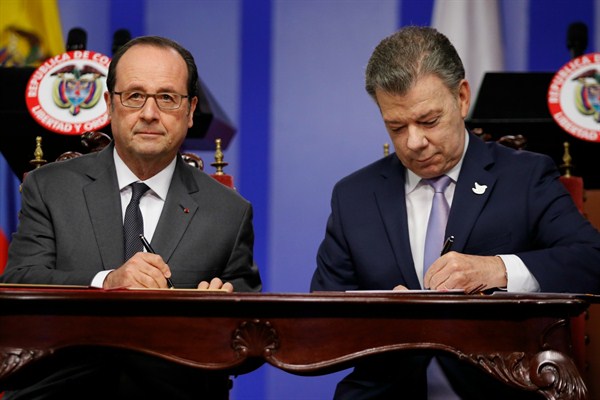While Donald Trump spent his first week as president of the United States rapidly upending ties with Mexico, undermining major free trade deals, and flaunting his protectionist ambitions, outgoing French President Francois Hollande visited Latin America, where he signed a host of bilateral agreements with Chile and Colombia. In Chile on Sunday, he warned against creeping protectionism, which he called the “worst response” that “impedes trade, hinders growth and even affects employment, including in countries that advocate for it and implement it.” The comment was an indirect jab at Trump and other populists on the rise, not least Marine Le Pen, who is expected to be a frontrunner in the race to succeed Hollande in May.
With unprecedented unpopularity at home, Hollande is not running in the upcoming election. He will leave office with a troubled legacy not only in France but abroad, including a spotty record in Africa, a major focus of French foreign policy. But while it may have been harder for Hollande to break with the complex and often corrupt nature of French policy in Africa, Latin America carries less baggage than France’s former colonial sphere of influence.
Under previous administrations, French relations across Latin America were limited to Mexico and Brazil. Those ties seriously deteriorated under Hollande’s predecessor, Nicolas Sarkozy, who soured on Latin America after initially hinting that he might prioritize the region. After signing a strategic agreement with former Brazilian President Lula da Silva in 2008, Sarkozy’s government distanced itself from the relationship as Brazil developed its diplomatic relations with Iran. “France found itself with a situation that needed a lot of work and a lot of investment,” says Jean-Jacques Kourliandsky, a research fellow at the Institute of International and Strategic Relations, a Paris-based think tank.

